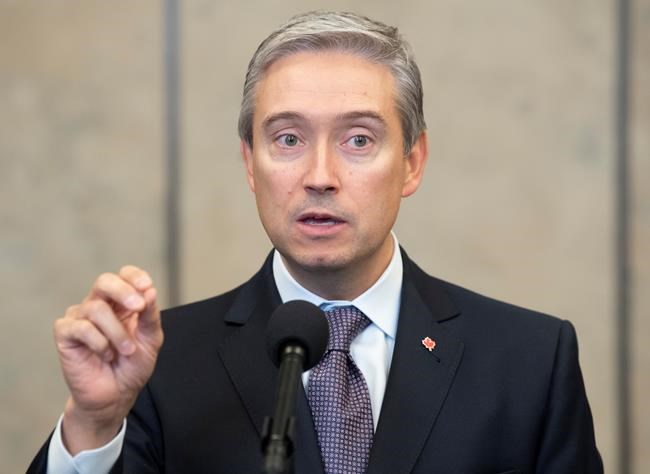Canadians urged to leave China now as first evacuation attempt hits snag
Advertisement
Read this article for free:
or
Already have an account? Log in here »
To continue reading, please subscribe:
Monthly Digital Subscription
$0 for the first 4 weeks*
- Enjoy unlimited reading on winnipegfreepress.com
- Read the E-Edition, our digital replica newspaper
- Access News Break, our award-winning app
- Play interactive puzzles
*No charge for 4 weeks then price increases to the regular rate of $19.00 plus GST every four weeks. Offer available to new and qualified returning subscribers only. Cancel any time.
Monthly Digital Subscription
$4.75/week*
- Enjoy unlimited reading on winnipegfreepress.com
- Read the E-Edition, our digital replica newspaper
- Access News Break, our award-winning app
- Play interactive puzzles
*Billed as $19 plus GST every four weeks. Cancel any time.
To continue reading, please subscribe:
Add Free Press access to your Brandon Sun subscription for only an additional
$1 for the first 4 weeks*
*Your next subscription payment will increase by $1.00 and you will be charged $16.99 plus GST for four weeks. After four weeks, your payment will increase to $23.99 plus GST every four weeks.
Read unlimited articles for free today:
or
Already have an account? Log in here »
Hey there, time traveller!
This article was published 05/02/2020 (2135 days ago), so information in it may no longer be current.
OTTAWA – Canadians are being encouraged to leave China while they still can as the federal government and counterparts around the world struggle to evacuate citizens from the centre of the novel coronavirus outbreak — and prevent further spread of the disease.
Federal cabinet ministers issued the call for all Canadians on non-essential business to leave China on Wednesday as the government’s first attempt at evacuating about 200 people from the Chinese city of Wuhan hit a snag due to bad weather.
The federal government was also facing questions over how it planned to get other Canadians out of the quarantined city, even as it announced having secured several dozen additional seats on board a U.S.-chartered aircraft.
And government officials were reaching out to 251 Canadians stranded on a cruise ship in Japan. The Japanese government quarantined the vessel after a confirmed case of the novel coronavirus, known as 2019-nCoV, was discovered on board.
“We have our mission in Tokyo, which has been in touch with the Canadians passengers to offer them consular assistance,” Foreign Affairs Minister Francois-Philippe Champagne said.
“And we will look to the cruise line, in this case, to repatriate those Canadians when the quarantine … is finished.”
Nearly 500 people have died and tens of thousands have been infected, the vast majority in China but increasingly outside the country as well, since the outbreak in Wuhan was first reported to the World Health Organization in December.
In response to the outbreak, the Chinese government has imposed the world’s largest-known quarantine, locking down Wuhan, a city of 11 million people, and the surrounding Hubei province.
Major airlines have also started to suspend flights to and from China.
It was in that context that Champagne and federal Health Minister Patty Hajdu issued separate calls for Canadians who could to leave China on commercial flights while they remain available.
“Those kinds of things raise some concerns about the ability for Canadians to be able to return in a timely fashion,” Hajdu said. “The message to Canadians is: listen, should you not have to be in China, it would be best to come back on a commercial flight.”
The encouragement came as a government-charted flight that was set to take 211 Canadians from Wuhan early Thursday morning local time was delayed. Crosswinds kept the plane from leaving Vietnam in time to make the narrow period China has allowed each day for evacuations.
“We’ve missed the window by about four hours due to winds,” said Champagne, who revealed that 373 Canadians had asked the government for help getting out of Wuhan — a number that has continued to grow since the outbreak started.
“The Chinese authorities to my knowledge have not allowed any country to evacuate their people in the daytime because they’re using the airspace in the daytime to bring food and medical supplies. So all of this happens in the nighttime.”

The airplane will now leave Thursday night local time, 21 hours later than anticipated.
The foreign affairs minister denied Canada’s tense relationship with China over the detention of Huawei executive Meng Wanzhou was affecting Ottawa’s evacuation efforts, which have been noticeably slower than the U.S. and some other countries.
Hajdu instead suggested those countries were at an advantage because they had diplomatic missions or large business interests in Wuhan. She also noted most Canadians in the area had not registered their presence with Global Affairs Canada until after the start of the outbreak.
Meanwhile, Canada’s ambassador to China, Dominic Barton, said some of the 650 embassy staff in Beijing were aware of a potential problem well before it hit headlines.
“A number of people in our Beijing embassy … were identifying this as a potential issue. We’ve been rolling since before it came out.”
Barton, in Ottawa to testify before a Commons committee, said he wants to “get the hell back” to help embassy staff serve Canadians in that country.
The flight delay was a good thing for at least one Canadian family hoping to get out of Wuhan.
Kate Schellenberg said her twin brother Michael, his wife Summer Wu and their one-year-old son Felix were informed they had a spot on the plane out to Canada, but had trouble getting to the airport because the Chinese government required a special permit to leave nearby Honghu.
Champagne also revealed that the U.S. State Department had offered to evacuate “a few dozen” Canadians from Wuhan on one of its own flights, which will leave several hours after the Canadian flight and return to the U.S. via Vancouver.
Those Canadians on board both flights will eventually be ferried to Canadian Forces Base Trenton in southern Ontario, where they will be monitored for two weeks to see if they have contracted the coronavirus.
There may be room for additional passengers who arrive in Canada from Wuhan at the motel on CFB Trenton where the first round of evacuees will be placed in mandatory quarantine, Maj.-Gen. Trevor Cadieu told the Commons’ health committee.

If not, the Armed Forces will take stock of available accommodations at Canadian forces bases across the country.
As for any Canadians left behind who still want help getting out of Wuhan, Champagne said the government is weighing its options and will decide whether it should send a second chartered flight to pick them up and return them home or turn to another ally.
Hajdu insisted the risk of the disease to Canadians remained low.
“We still are in a situation where our officials are working extremely well together, as evidenced by how quickly we’re being able to detect cases and keep people healthy,” she said.
“But I also want to ask that people who are travelling from the Hubei region consider isolation at home to help us with that global effort to contain that spread for 14 days.”
This report by The Canadian Press was first published Feb. 5, 2020.
— With files from Laura Osman







